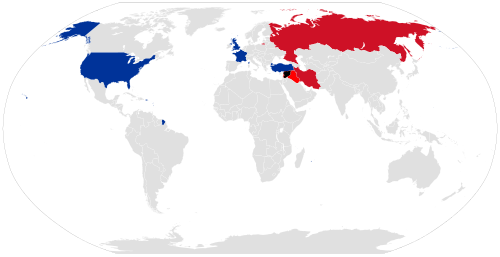
Back التدخل الأجنبي في الحرب الأهلية السورية Arabic Удзел замежных краін у грамадзянскай вайне ў Сірыі Byelorussian مداخله خارجی در جنگ داخلی سوریه Persian Syyrian sisällissota ja ulkomaat Finnish 외국의 시리아 내전 관여 Korean شام دی خانہ جنگی وچ غیر ملکی مداخلت PNB Envolvimento estrangeiro na Guerra Civil Síria Portuguese Иностранное участие в гражданской войне в Сирии Russian Supportu stranieru ntrâ guerra civili siriana SCN سوریہ کی خانہ جنگی میں غیر ملکی مداخلت Urdu
This article's factual accuracy may be compromised due to out-of-date information. The reason given is: This article is significantly out of date. Many organizations mentioned within it have either ceased existing, or merged/reformed into other organizations.
Several of the arms-supplying states mentioned in this article have ceased their involvement in the war, while others have since intervened via direct military action. Moreover, the ISIL-focused intervention, which is emphasized within the page, is no longer the centre of intervention efforts, as the major operations against ISIL-held territory ended about a year ago. (January 2020) |


Foreign involvement in the Syrian civil war refers to political, military and operational support to parties involved in the ongoing conflict in Syria that began in March 2011, as well as active foreign involvement. Most parties involved in the war in Syria receive various types of support from foreign countries and entities based outside Syria. The ongoing conflict in Syria is widely described as a series of overlapping proxy wars between the regional and world powers, primarily between the United States and Russia[1][2][3][4][5][6] as well as between Iran and Saudi Arabia.[7]
The Syrian Ba'athist regime under President Bashar al-Assad is politically and militarily supported by Iran and Russia, and actively supported by the Lebanese Hezbollah group, the Syrian-based Palestinian group PFLP-GC, and others. Since 30 September 2015, Russia has openly deployed its military assets in Syria and has been waging an intensive air campaign against anti-government forces in Syria, in support of and at the request of the Assad government. The military activity of Russia in Syria has been criticized by the US and its regional allies; Turkey overtly clashed with the Russian military in November 2015 over the alleged violation of its airspace by a Russian plane, as well as over Russia′s bombardment of the areas held by anti-government forces supported by Turkey.[8]
The Syrian opposition, politically represented by the Syrian National Coalition, receives financial, logistical, political and in some cases military support from major Sunni states in the Middle East allied with the U.S., most notably Saudi Arabia, Qatar, and Turkey. From the early stages of the conflict in Syria, major Western countries such as the U.S, France, and the UK have provided political, military and logistic support to the opposition and its associated rebel groups in Syria.
The Syrian Democratic Forces of the Executive Council (Rojava), the government of Rojava, have received military and logistic support from some NATO countries, the US in particular. Since July 2015, it has been attacked by the Turkish military and the Turkish-backed Free Syrian Army, leading to the Turkish occupation of northern Syria.
From 2014 until October 2017, a significant part of Syria's territory was controlled by the Islamic State of Iraq and the Levant (ISIL), an entity internationally recognised as terrorist, a number of Western and other countries, most notably the U.S., Russia, Britain, and France, have participated in direct military action against ISIL in both Syria and Iraq.
- ^ Cite error: The named reference
largerwas invoked but never defined (see the help page). - ^ "John McCain says US is engaged in proxy war with Russia in Syria". The Guardian. 4 October 2015. Archived from the original on 12 October 2015. Retrieved 17 October 2015.
- ^ "U.S., Russia escalate involvement in Syria". CNN. 13 October 2015. Archived from the original on 17 October 2015. Retrieved 17 October 2015.
- ^ ""The Russians have made a serious mistake": how Putin's Syria gambit will backfire". Vox. 1 October 2015. Archived from the original on 22 October 2015. Retrieved 26 October 2015.
- ^ In Syrië dreigt nu een proxy-oorlog: Rusland vs Amerika VS leveren extra wapens aan rebellen die vechten tegen Assad, lees: Moskou. Terug naar jaren 80 in Afghanistan. Archived 3 February 2016 at the Wayback Machine NRC Handelsblad, 14 October 2015 ("In Syria, a proxy-war now is looming").
- ^ U.S. vs. Russia: What a war would look like between the world′s most fearsome militaries Archived 10 March 2018 at the Wayback Machine Militarytimes.com, 24 January 2016.
- ^ "Saudi Arabia and Iran must end their proxy war in Syria". The Guardian. 15 December 2013. Archived from the original on 8 December 2015. Retrieved 30 November 2015.
- ^ "Turkey condemns attack on Syrian Turkmen village, summons Russian envoy". Hürriyet Daily News. 20 November 2015. Archived from the original on 16 January 2016. Retrieved 25 December 2015.